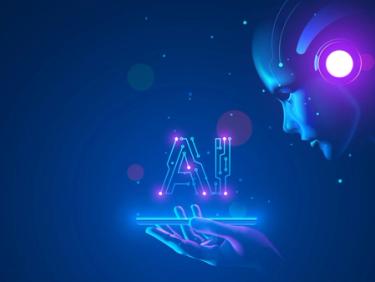Insight11 min read
The impact of artificial intelligence in paid media
Mon Jul 12 2021 | Marketing Team

- Insight
- Performance
- PPC
Tags
Digital marketing has evolved fast. One of the largest shifts we’ve seen is the increase in artificial intelligence (AI) and automation within paid media. AI isn’t as daunting as it sounds and it’s not just the latest paid media trend either. This technology provides the solution that many marketers need – the gift of time. In this blog, we look at the impact of AI on paid media and how it can be used to get even more from your budget and campaign performance.
Key takeaways
- What is artificial intelligence?
- How does artificial intelligence fit into paid media?
- Is artificial intelligence the future of paid media?
- How can you use artificial intelligence in your paid media strategy?
Artificial intelligence marketing: What is it?
AI marketing uses technology to enhance the customer journey and boost the ROI of your paid media campaigns. This is done by using analytics and machine learning, among other tactics, to gain insight into your target audience.
How does AI fit into paid media?
Fuelled by the insights generated by AI, you can create more impactful customer touchpoints. Whether it’s email marketing or a PPC campaign, AI eliminates the guesswork and allows you to optimise based on the data. This technology can be used to both streamline and optimise marketing campaigns. Often used to automate processes that once relied on human intelligence such as PPC ads and content creation, it can also reduce the risk of manual error. However, to really connect with your audience, you still need the human touch. Storytelling and empathetic marketing are things that machines can’t replicate – at least not yet. In the meantime, let’s take a look at why automation technology could be the future of paid media.
AI and the future of paid media
The world of paid media is constantly changing. As Google introduces new tools, tactics and features, advertisers have to adapt their PPC strategies to keep up. Automation technology can help advertisers keep ahead of the paid media game without having to reinvent strategies every time a change occurs. With marketing automation driving an increase of around 15 percent in sales productivity and a 12 percent reduction in marketing overheads, there’s no wonder more businesses are investing in automation than ever before. The benefits of using AI to support your paid media efforts are two-fold. With the potential to power you towards your business goals, here’s why AI will play a large role in the future of paid media…
Improved efficiency
Automation tools can increase efficiency, saving you time and money. While automation plays an important role in paid search, these tools are not at the expense of marketing teams. Instead, automation acts as a supplement to your efforts, bettering results and freeing up more time and resources to focus on growth opportunities. Whether it’s complicated tasks or day-to-day ones, the right automation technology can help you get more from your paid media efforts. Examples could include:
- Alerts and anomaly detection: These features mean you spend less time monitoring performance and more time improving it
- Bid automation: Bid automation can identify performance-enhancing opportunities and act on them too
- Ad creation: Automation technology can even be used for ad creation to save you time while creating and testing ad copy
Improved decision making
Artificial intelligence helps you make better decisions based on data and your unique business objectives. Using machine learning to analyse your data can unlock new opportunities when it comes to your audience targeting and performance. Automated forecasts can also lend a helping hand when it comes to making decisions. Most advertisers rely on a test and learn approach to understand how their bids will perform. But real-time forecasting based on data can help you project how strategies may change and perform at a later stage. This insight can be used to make smarter decisions to improve your campaign performance.
Less budget waste
Anomaly detection, a form of automation, can detect and stop issues before they have a chance to damage your campaign performance. This means your budget is never being wasted when issues with your campaigns occur. In line with this, more efficient bidding using bid automation technology can help to significantly reduce wasted ad spend. This tool uses algorithms that consider the value of each keyword in meeting your ad goals. In turn, only the minimum necessary budget is spent on keywords ensuring optimum performance is delivered at the optimum price.
More growth opportunities
AI saves time, improves campaign performance and reduces wasted ad spend. The result? More time and resources to spot and pursue growth opportunities. Rather than focusing on maintaining campaigns, PPC automation can free up more time and money to explore new strategies, audience targeting, ad types and other marketing platforms. AI and machine learning hold the power to uncover real-time insights and improve performance than any human team alone. As automation is adopted by more and more marketing teams, taking advantage of these tools will soon become a necessity to scale your strategy and keep up in the competitive paid media landscape.
Omnichannel experiences
You’ll probably have heard the word ‘omnichannel’ before. But what does it mean and how does it relate to automation? Creating omnichannel experiences involves integrating different ways to shop to create a seamless buying experience, no matter the channel. Regardless of whether customer engagement is through digital or traditional stores, a consistent experience is key. When AI-powered platforms are used to manage and optimise paid media channels, omnichannel tactics are already being deployed. Omnichannel automation means customers will receive timely, relevant and personalised content based on where they are in the marketing funnel. Essentially, the right message is delivered to the right person at the right time on the right channel and on the right device. This helps the customer feel less like a sales target and more like a real person.
How can AI be used in paid media?
Dynamic search ads
Dynamic Search Ads are a Google special and the simplest way to find customers who are searching for what you offer. These ad types automatically create relevant headlines for your campaigns based on your site’s content helping to keeps your ads up to date while saving you time and directing potential customers to where they want to be on your site. The search engine crawls your website before matching your landing pages to closely related search terms. When a user’s search is relevant to what you offer, Google Ads will dynamically create and display a relevant ad. As well as creating your ads, you can also rely on Dynamic Search Ads to further optimise them. Using Dynamic Search Ads, you can automatically rotate different ad versions to identify which is most effective. Google’s AI technology uses previous campaign performance to suggest ways to improve ad copy. Ad suggestions are based on headlines, descriptions, extensions and information found on landing pages. Without Dynamic Search Ads, even well-managed Google Ads can miss relevant searches and can experience delays in getting ads written for new products.
Anomaly detection
Spotting and fixing issues are some of the most important aspects of PPC. But no one person can monitor PPC accounts all day, every day. Issues are bound to occur that can’t be addressed fast enough to avoid a drop in campaign performance. That’s where automation can help. Automated anomaly detection can look for data issues by comparing key metrics such as cost, revenue, clicks and CPC. If an issue is detected, the bidding can be paused until the problem is resolved.
Automated performance forecasts
Accurate forecasting is essential for budgeting your campaigns. Being aware of how a strategy change could impact performance allows you to better allocate budget spend to really get the most out of your money. When done manually, creating accurate forecasts can be challenging, timeconsuming and these forecasts quickly become outdated. Accurate forecasting requires you to continuously update your data with the latest statistics – a task you will unlikely have time for. Google Ads can be used to automatically create performance forecasts using Keyword Planner. And it couldn’t be simpler. All you have to do is upload your keyword terms to generate a detailed forecast report of clicks, cost, impressions and more. Backed by up-to-date data, you can make better-informed decisions based on the latest insights.
Scripts
Google Ads scripts can be used to make automatic account changes using JavaScript code. Scripts can be used in many different ways including for bidding, reporting, alerts and more. You can also use scripts to automatically create ads from product information saved in Google Sheets.
How will you use AI?
Using AI and machine learning will equip you with deeper insight into your customers. Backed by the power of AI will enable you to reach qualified leads through different stages of the sales funnel. Not only will you be able to personalise interactions with your audience, but you can also predict future customer behaviour based on collected data. It’s quite simply becoming impossible to improve and scale your paid media efforts without artificial intelligence. However, this type of technology is evolving fast. It will come as no surprise if new and better methods of using automation come to life over the coming years. Whichever route AI takes, it’s safe to say it will play a significant role in the future of paid media. If you want to find out how you can use AI as part of your PPC efforts or how to make the most from paid media today, get in touch with our experts.


